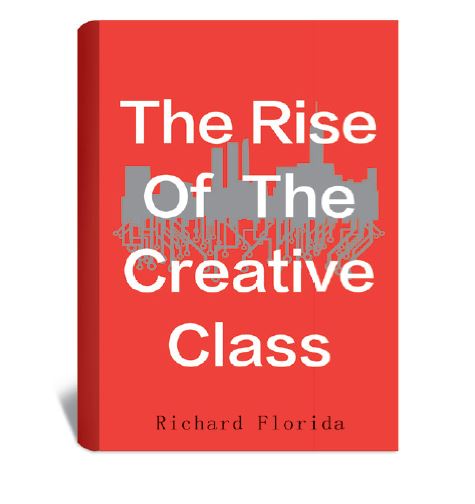In the best-selling book "The Rise of the Creative Class", Richard Florida showed us how the new economic class will dominate our future cities and economy. He pointed out that human creativity is the most fundamental economic resource, and the arrival of the era of creative economy is changing social and cultural values of the entire world. The book was also named as one of the Harvard Business Review's Breakthrough Idea of the Year.
PKU Financial Review exclusively interviewed Richard Florida, professor and head of the Martin Prosperity Institute at the Rotman School of Management at the University of Toronto, and a Distinguished Fellow at NYU's School of Professional Studies. In the interview, he said that cities have become an organizational platform in the era of creativity and knowledge economy, and city's agglomeration power is a powerful engine that promotes innovation, competitiveness and long-term prosperity. Innovation, as well as the continuous integration of innovative companies, technologies and personnel, will continue to promote economic growth and social prosperity.
PKU Financial Review: The Rise of the Creative Class clearly shows us how a new economic class will dominate our future cities and economies. How do you see the development of urban agglomeration in the future? In your imagination, what kind of changes will urban agglomeration have due to new technologies?
Florida: Clustering and agglomeration will remain. This whole argument about the pandemic disrupting our dislodging clustering or agglomeration is devoid of historical context. Previous pandemics have done little to really to bend the long arc of urbanization.
We know that clustering is even more important for the knowledge economy than it was for the older industrial economy. As Robert Lucas showed us in his classic essay, “On the Mechanics of Economic Development,” where he updated Jane Jacobs in an economic theory framework, clustering is the key factor that drives economic growth in an advanced in a bit of knowledge-based economy.
Today, the city has become the basic organizing unit or platform for highly clustered knowledge-based capitalism. Just as the factory and corporation were the organizing unit for the industrial age, cities have become the organizing platform for the creative and knowledge economy. The urban clustering force is powerful engine for driving innovation, competitiveness and long-term prosperity. While technology will bring greater flexibility for remote work, access to more specialized talent pools, and an increased balance between work and life, economic growth, innovation and prosperity will be continued to be fueled by innovative the mixing and mingling of creative enterprises and skilled, creative workers.
PKU Financial Review: You once mentioned that in the 21st century U.S has grown beyond a country of cities and suburbs, which is called "mega-regions." How do you evaluate the current state of urban agglomeration in US? For example, many people view San Francisco and Los Angeles as the typical satellite cities of post-urbanization. People go to work during the day and return to the nearby suburb at night. Do you think urban agglomeration change is inevitable around the world? What advice do you have for the development of urban agglomeration in developing countries like China?
Florida: We used to satellite images of the world at night to actually get a handle on where the economic power centers of the world really are. There are thousands upon thousands of cities and more than 200 nations that make up the global economy. We found looking at these light signatures is that there are about 40 mega-regions that are the real economic units the power the world economy.
Mega-regions are combinations of multiple cities and metropolitan areas. These are places like the Boston-New York-Washington Corridor. China is home to about a dozen of the world’s largest mega-regions; your economy is defined by them.
I believe that the mega-region is the defining spatial form of knowledge-based capitalism. You need the size and scale of the mega-region to compete. Look at the shift in high-tech startups. Decades ago they were almost all concentrated suburban areas like California’s Silicon Valley. But now they are concentrated in cities and mega-regions. All of the leading centers identified in our global startup city report- the San Francisco Bay area, New York-Washington corridor, Shanghai, Beijing, Mumbai, London, Los Angeles in Southern California. Every one of these places as part of a huge mega-region.
PKU Financial Review: You argued in your book The New Urban Crisis that, "return to the city" is not as good as it seems. There will be a situation where city expands with no economic growth, and population increases with more people living in slums. Now the urbanization rate in China has reached more than 60%, and the housing prices in major cities are very high. We are worried that this kind of "no-growth urbanization" will appear in the future. China wants to use urban agglomeration to connect super-large cities and medium-sized cities through super high-speed rail. Do you think this method effective? Or do you have any advice for China?
Florida: Keep doing what you were doing: building mega-regions. Keep building density, but not just super skyscrapers. The real density that matters is on the street. When we look at the most innovative neighborhoods or districts in the world, they are in places like lower Manhattan or in parts of San Francisco which have older factory building some laughs and which have tremendous street level energy and activity.
PKU Financial Review: Cities used to be the opportunity ladder for rural or low-skilled population. However, due to debt problems in the post-epidemic cities, it is estimated that a lot of benefits will be cut off. The poor cannot get cheap government housing as they did in the past, and with the rise of new technologies such as big data and AI, it is more difficult for the low-skilled to get jobs. In your opinion, how to solve the problem of unequal opportunities in cities in the future?
Florida: Yes, our societies are increasingly divided based on who has education, and even more so who is doing knowledge-based or creative work. In the United States about half of the workforce works in low wage service jobs, and these workers are falling further and further behind. It is very important to focus on creating better jobs for less skilled people. The example here is what happened in manufacturing. My own father was a factory worker. He picked up work in a factory at age 13 during the Great Depression of the 1930s to help support his family. It took nine people to make a family wage, each of his parents and all of the siblings. But by the 1940s and 50s, his same job in that same factory was paying a family wage; he could buy a home, have a family, and put my brother and I through college. We made factory work high-paying work. We have to do the same for routine service work. we cannot succeed which such an unequal and divided society, where too many workers and families lack economic opportunity.
PKU Financial Review: Now, for cities all over the world, digitalization is an important technological opportunity. For example, Shenzhen and Hangzhou in China, which were previously unknown, used the Internet and digital technology to become a symbol of China. Which cities in US do you think will be reshaped greatly during the trend of digitalization? Does digitization really increase the productivity of cities, or re-enhance the advantages of the original large cities?
Florida: Digitalization is a key trend of the knowledge age. I think the big shift is going to be towards digital urban technology. If factory technology, the moving assembly line, and robotics were the key technologies of the industrial age new smarter digital technologies in cities will be the motivating technologies of our new knowledge based urban age. I call these technologies urban technology or urban tech. They are now a huge segment of venture capital finance startups.
China has tremendous advantages along with United States in these urban technologies. My belief is that these urban technologies will prove to be the most important, maybe even as important software, artificial intelligence, or life sciences.
PKU Financial Review: From your point of view, how do you evaluate the response of different cities to the COVID-19 epidemic and their handling strategies?
Florida: I think that we emphasized public health too much and we need an approach which blends public health with economic growth and innovation. What makes me most optimistic as the speed at which vaccines were developed in the United States and in China using a new platform technology. I think this shows the power of innovation. But we have to be prepared for future pandemics.
PKU Financial Review: From Chicago’s George Floyd event, we can see that urban decline is inevitable. In some cities, urban population density is declining, and private sector is hopeless for revival, while public sector often has a large lag effect and cannot quickly respond to new changes. What ways do you effective to alleviate or cope with the decline of cities?
Florida: We are witnessing an industrial revolution and economic revolution and the disruptions that come with that. New economic systems are highly unequal, they create political disruption. What actually makes me hopeful is that these disruptions have not been as deep as they have been in the past, where we have experienced major system breakdowns, revolutions combinations even world wars
I think we are managing this one pretty well. China and the United States are two of the greatest world powers and are doing actually better at getting along than most people think. Nothing is perfect. We’re going through a highly disruptive time, but I we’re going to be better coming out of this than we ever have been before.
The collaboration between scientists and social scientists in the US and China will be key to it. I actually think the biggest area of intellectual growth and scholarship has to be urbanism and the relationship between urbanism and technology. At the University of Toronto where I teach, we created a School of Cities. We need more and more research on how to build better more equitable, dynamic and resilient cities. And, we need to cooperate across borders to do that.

 Professor and head of the Martin Prosperity Institute,
Professor and head of the Martin Prosperity Institute,
the Rotman School of Management at the University of Toronto
Distinguished Fellow at NYU's School of Professional Studies
















